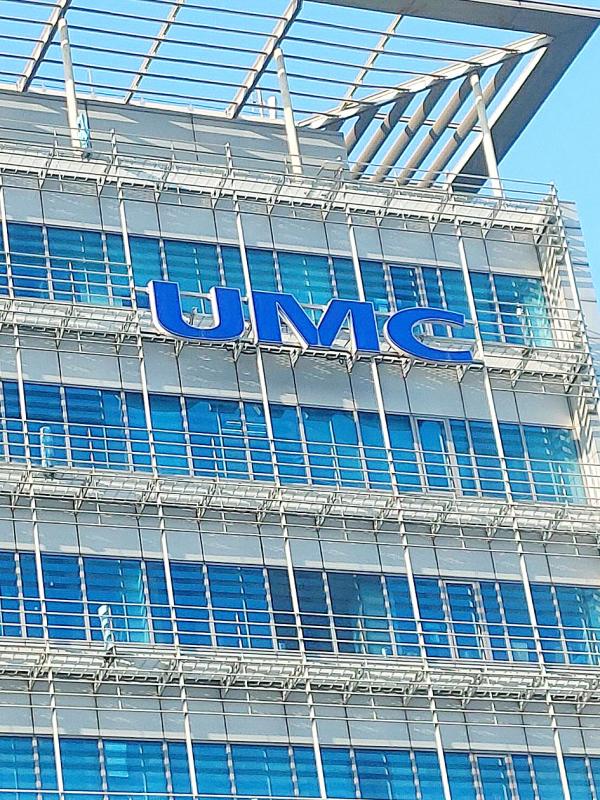United Microelectronics Corp (UMC, 聯電), the world’s third-largest contract chipmaker, saw its net profit grow almost 3-folds last quarter, thanks to robust chip demand for consumer electronics and computing-related applications.
Net profit surged to NT$11.2 billion (US$394.64 million) during the final quarter last year, compared with NT$3.84 billion in the same period of 2019. On a quarterly basis, net profit jumped 171 percent from NT$9.11 billion, UMC said yesterday.
For the full year of last year, net profit expanded 200 percent to NT$29.19 billion, from NT$9.71 billion. That translated into earnings per share of NT$2.42 last year, up from NT$0.82 in 2019.

Photo: Grace Hung, Taipei Times
Strong demand drove UMC’s factory utilization rate to 99 percent last quarter from 97 percent in the third quarter last year, the Hsinchu-based chipmaker told investors, adding that it expects the ratio to climb to 100 percent this quarter.
The firm can add a mere 3 percent more wafer capacity this year, primarily from 12-inch fabs, UMC copresident Jason Wang (王石) told a teleconference.
Demand for 8-inch wafers and some 12-inch wafers has outpaced capacity growth, Wang said.
The company said it expects 28-nanometer capacity to expand 20 percent this year, with revenue contribution climbing to about 25 percent from 14 percent last year.
UMC is open to new merger-and-acquisition opportunities to expand capacity, Wang said.
Asked about a shortage of auto chips, he said that UMC is “trying its best to mitigate the shortage.”
“We have been doing that since the beginning of this year,” he said. “Looking into the first quarter, stable demand will lead to an incremental increase in wafer shipments and blended average selling prices in US dollar terms.”
UMC said that it expects chip prices to increase by 2 to 3 percent from last quarter in US dollar terms, while wafer shipments are to grow at a quarterly pace of 2 percent.
As supply constraints are likely to last for the next few quarters, chip prices would rise by 4 to 6 percent this year, it said.
Gross margin would expand to 25 percent this quarter from 23.9 percent last quarter, on the back of price hikes, UMC said.
However, the appreciation of the New Taiwan dollar against the US dollar would offset more than half of the implied growth projected for the current quarter, Wang said.
UMC “continues to share the foundry industry’s positive view for wafer demand” for this year, Wang said, adding that the company plans to spend US$1.5 billion on new equipment this year, up 50 percent from US$1 billion last year.

In Italy’s storied gold-making hubs, jewelers are reworking their designs to trim gold content as they race to blunt the effect of record prices and appeal to shoppers watching their budgets. Gold prices hit a record high on Thursday, surging near US$5,600 an ounce, more than double a year ago as geopolitical concerns and jitters over trade pushed investors toward the safe-haven asset. The rally is putting undue pressure on small artisans as they face mounting demands from customers, including international brands, to produce cheaper items, from signature pieces to wedding rings, according to interviews with four independent jewelers in Italy’s main

Macronix International Co (旺宏), the world’s biggest NOR flash memory supplier, yesterday said it would spend NT$22 billion (US$699.1 million) on capacity expansion this year to increase its production of mid-to-low-density memory chips as the world’s major memorychip suppliers are phasing out the market. The company said its planned capital expenditures are about 11 times higher than the NT$1.8 billion it spent on new facilities and equipment last year. A majority of this year’s outlay would be allocated to step up capacity of multi-level cell (MLC) NAND flash memory chips, which are used in embedded multimedia cards (eMMC), a managed

Japanese Prime Minister Sanae Takaichi has talked up the benefits of a weaker yen in a campaign speech, adopting a tone at odds with her finance ministry, which has refused to rule out any options to counter excessive foreign exchange volatility. Takaichi later softened her stance, saying she did not have a preference for the yen’s direction. “People say the weak yen is bad right now, but for export industries, it’s a major opportunity,” Takaichi said on Saturday at a rally for Liberal Democratic Party candidate Daishiro Yamagiwa in Kanagawa Prefecture ahead of a snap election on Sunday. “Whether it’s selling food or

In the wake of strong global demand for AI applications, Taiwan’s export-oriented economy accelerated with the composite index of economic indicators flashing the first “red” light in December for one year, indicating the economy is in booming mode, the National Development Council (NDC) said yesterday. Moreover, the index of leading indicators, which gauges the potential state of the economy over the next six months, also moved higher in December amid growing optimism over the outlook, the NDC said. In December, the index of economic indicators rose one point from a month earlier to 38, at the lower end of the “red” light.